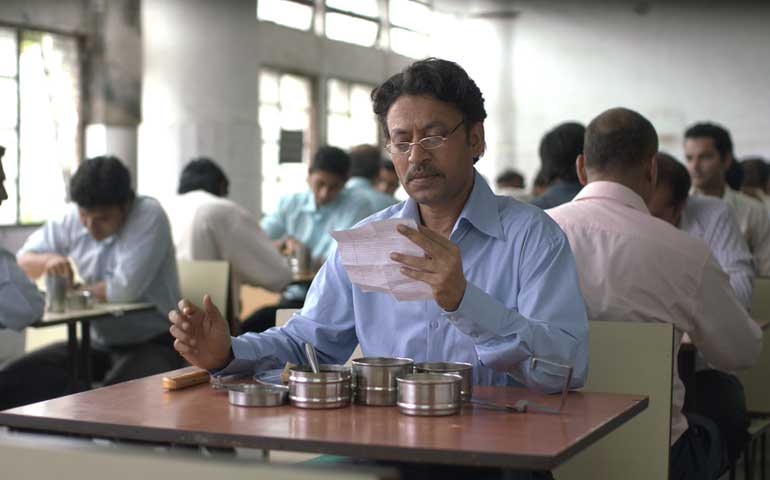
Irrfan Khan as Saajan in "The Lunchbox" (Photos courtesy of Sony Pictures Classics/Michael Simmonds)
The lunchbox delivery system in Mumbai, India, is the stuff of legend. While it has a simple goal -- to carry lunchboxes from home kitchens to workplaces, and then to collect the empty lunchboxes and restart the process in reverse -- the logistics are mind-boggling in their complexity. The system entails mobilizing a 5,000-strong workforce to carry some 200,000 lunchboxes a day: by bike, railway, cart, and on foot, rain or shine, through Mumbai's urban chaos, to the right delivery address. On time. Each time.
Known as dabbawala, literally, "can-carrier," in reference to the stackable stainless food canisters (dabba), the lunchbox delivery system is so efficient that in 2001, Forbes magazine cited the system's astonishing service record and estimated that only one out of 16 million deliveries ever goes awry.
This is the intriguing human resource network within which two lonely souls, Saajan (Irrfan Khan) and Ila (Nimrat Kaur), find a connection in the film "The Lunchbox." Ironically, the film's plot is not premised on the dabbawala system's legendary efficiency, but on its speck of imperfection: The story is built on that one in 16 million chance of a botched delivery.
Ila is a dedicated middle-class housewife whose daily chores include preparing lunch for her unresponsive, workaholic husband. Prompted by an upper-floor neighbor, an unseen "Auntie" who often dispenses cooking advice, Ila prepares sumptuous recipes on the dubious, timeworn assumption that the way to a man's heart is through his stomach.
One day, she finds out that the dabbawala had been delivering to the wrong office address; Saajan, an aging widower who is nearing retirement from his accounting job of 35 years, had been receiving the lunchbox and savoring her cooking. When Ila includes a short note in the lunchbox informing the then-anonymous recipient about the mistake, she receives a note in return.
The exchange continues until what had started as feedback on her cooking becomes a meaningful sharing of confidences. The trust between them so deepens that Ila feels free to share about her painful discovery that her husband is having an affair. In between servings of flavorful food and meaningful, handwritten thoughts, a genuine -- albeit fragile -- relationship forms between Saajan and Ila.
"The Lunchbox" is the inaugural work of Indian filmmaker Ritesh Batra, who is also credited for the film's screenplay. While the bustling Mumbai setting invites a splashy cinematic approach in typical Bollywood fashion, Batra deftly handles his material so that camerawork, editing, music and even color are unobtrusive. The touches of magic realism in the film do not appear as contrivances; they flow organically from the dramatic arc and are rendered with subtlety.
Subtle is also the best way to describe Batra's treatment of the characters' emotions in the film, and this is ferried onscreen by the astonishing performances of the lead actors, whose gestures and facial poetics become thresholds to their inner selves.
The fragile human connection, even just via old-fashioned correspondence, will prove to be transformative for the film's lead characters. It softens the normally myopic and aloof Saajan, who begins to notice the simple joys of his day-to-day routine, and remembers the blissful moments he shared with his late wife.
Between the two leads, it is Ila who undergoes a more profound transformative journey. In her note to Saajan following the rude awakening to her husband's unfaithfulness, she expresses her dream of moving to neighboring Bhutan, a tiny country that, according to what her daughter learned in school, measures its worth in terms of GNH -- gross national happiness -- rather than GDP (gross domestic product). Based on an actual holistic philosophical paradigm espoused by Bhutan's national leaders, GNH represents a sustainable balance between material and non-material values as an index of its people's well-being. (Interestingly, Mumbai has the highest GDP among Indian cities.)
Ila's reflection bespeaks her simmering protest of her husband's singular focus on earning a living at the expense of nonmaterial values such as loyalty and mutuality. At the same time, it is also a positive appeal; Ila articulates her vision of a life authentically lived where she may reclaim the happiness that she deserves.
Following the death of her bedridden father, reality crystallizes for Ila when, in an honest lament, her widowed mother inadvertently mirrors back to her the meaningless redundancy of her servile life: "I'm very hungry. ... I was making breakfast for him. I was always worried about what would happen to me when he passed away. But now, I just feel hungry." Releasing sentiments long-suppressed, her mother adds, "In the beginning, there was a lot of love between us ... but the past few years, I've been disgusted by him. Every morning, his breakfast, his medicine, his bath ... breakfast, medicine, bath ..."
Ila knows that she must cut the scarlet thread of victimhood and choose a new, life-giving path for herself. While there are no overt theological references in "The Lunchbox," Ila's liberating journey dovetails with the quest for women's full, authentic humanity that has been an abiding touchstone of feminist theology.
Not surprisingly, food is a consistent visual motif in "The Lunchbox." For the most part, it is a celebratory symbol, an affirmation of promise and renewed possibilities. Over delectable Indian dishes that are soulfully and generously prepared and shared, relationships deepen and the characters begin to dream again. The subtle hints to a certain transformative power implicit in a meal, a "sacramental" quality if you will, is an audiovisual treat that holds appeal across cultures and religions.
That said, the film also uses the food motif to dramatize the lack of "nourishment" in other areas of the characters' lives -- the women are portrayed as cooks, yet they are "hungry" for a happier life.
Serious as a couple of thematic threads may sound, "The Lunchbox" is anything but heavy-handed. It is an exultant blending of intelligent drama, cultural richness and good-natured charm. At the 66th Cannes film festival held in 2013, the sellout audience gave "The Lunchbox" a rousing 12-minute standing ovation, and this would be reprised in a string of other international screenings. My guess is that your reception of the film, which is available on DVD or Netflix, will be equally enthusiastic.
Provided, of course, that you do not view it on an empty stomach.
[Precious Blood Br. Antonio D. Sison is author of the book World Cinema, Theology, and the Human: Humanity in Deep Focus.]


